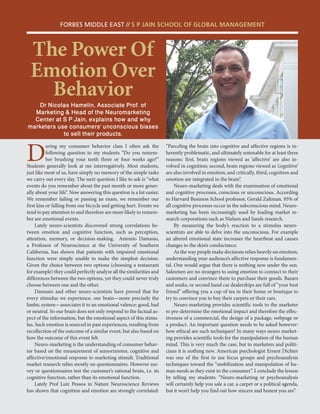
Forbes neuromarketing S P Jain
- 1. D uring my consumer behavior class I often ask the following question to my students “Do you remem- ber brushing your teeth three or four weeks ago?” Students generally look at me interrogatively. Most students, just like most of us, have simply no memory of the simple tasks we carry out every day. The next question I like to ask is “what events do you remember about the past month or more gener- ally about your life”. Now answering this question is a lot easier. We remember failing or passing an exam, we remember our first kiss or falling from our bicycle and getting hurt. Events we tend to pay attention to and therefore are more likely to remem- ber are emotional events. Lately neuro-scientists discovered strong correlations be- tween emotion and cognitive function, such as perception, attention, memory, or decision-making. Antonio Damasio, a Professor of Neuroscience at the University of Southern California, has shown that patients with impaired emotional function were simply unable to make the simplest decision. Given the choice between two options (choosing a restaurant for example) they could perfectly analyze all the similarities and differences between the two options, yet they could never truly choose between one and the other. Damasio and other neuro-scientists have proved that for every stimulus we experience, our brain—more precisely the limbic system—associates it to an emotional valence: good, bad or neutral. So our brain does not only respond to the factual as- pect of the information, but the emotional aspect of this stimu- lus. Such emotion is sourced in past experiences, resulting from recollection of the outcome of a similar event, but also based on how the outcome of this event felt. Neuro-marketing is the understanding of consumer behav- ior based on the measurement of sensorimotor, cognitive and affective/emotional response to marketing stimuli. Traditional market research relies mostly on questionnaires. However sur- vey or questionnaires test the customer’s rational brain, i.e. its cognitive function, rather than its emotional function. Lately Prof Luiz Pessoa in Nature Neuroscience Reviews has shown that cognition and emotion are strongly correlated: “Parceling the brain into cognitive and affective regions is in- herently problematic, and ultimately untenable for at least three reasons: first, brain regions viewed as ‘affective’ are also in- volved in cognition; second, brain regions viewed as ‘cognitive’ are also involved in emotion; and critically, third, cognition and emotion are integrated in the brain”. Neuro-marketing deals with the examination of emotional and cognitive processes, conscious or unconscious. According to Harvard Business School professor, Gerald Zaltman, 95% of all cognitive processes occur in the subconscious mind. Neuro- marketing has been increasingly used by leading market re- search corporations such as Nielsen and Sands research. By measuring the body’s reaction to a stimulus neuro- scientists are able to delve into the unconscious. For example an altered emotional state increases the heartbeat and causes changes to the skin’s conductance. As the way people make decisions relies heavily on emotion, understanding your audience’s affective response is fundamen- tal. One would argue that there is nothing new under the sun. Salesmen are no strangers to using emotion to connect to their customers and convince them to purchase their goods. Bazars and souks, or second hand car dealerships are full of “your best friend” offering you a cup of tea in their home or boutique to try to convince you to buy their carpets or their cars. Neuro-marketing provides scientific tools to the marketer to pre-determine the emotional impact and therefore the effec- tiveness of a commercial, the design of a package, webpage or a product. An important question needs to be asked however: how ethical are such techniques? In many ways neuro market- ing provides scientific tools for the manipulation of the human mind. This is very much the case, but to marketers and politi- cians it is nothing new. American psychologist Ernest Dichter was one of the first to use focus groups and psychoanalysis techniques toward the “mobilization and manipulation of hu- man needs as they exist in the consumer”. I conclude the lesson by telling my students: “Neuro-marketing or psychoanalysis will certainly help you sale a car, a carpet or a political agenda, but it won’t help you find out how sincere and honest you are”. FORBES MIDDLE EAST // S P JAIN SCHOOL OF GLOBAL MANAGEMENT The Power Of Emotion Over Behavior Dr Nicolas Hamelin, Associate Prof. of Marketing & Head of the Neuromarketing Center at S P Jain, explains how and why marketers use consumers’ unconscious biases to sell their products.
